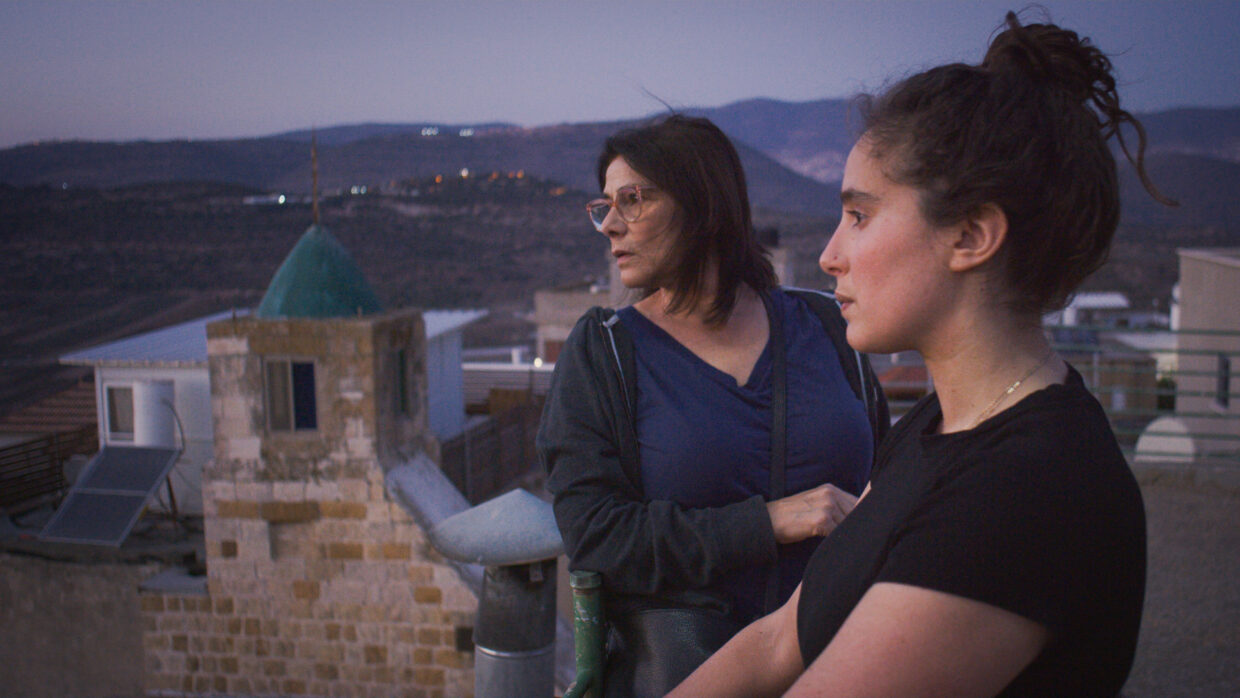 Back to selection
Back to selection
“Forgetfulness is Fought with Words”: Lina Soualem on Her TIFF-Premiering Doc, Bye Bye Tiberias
 Bye Bye Tiberias
Bye Bye Tiberias “I wonder if we can find ourselves fully in a world we invented,” the French-Palestinian-Algerian filmmaker and actor Lina Soualem eloquently ponders in the role of ever-questioning narrator of Bye Bye Tiberias, her extraordinary, multigenerational, female-focused family portrait. Seen through contemporary footage and 90s home movies — expertly interwoven with material from historical archives — the women include not only Soualem’s conservative, customs-observing grandmother and great-grandmother, who never left the Palestinian village their entire community had been forcibly displaced to, but also her mother, Hiam Abbass, a rebellious dreamer set on becoming an international actress. And now, 30 years on and nearly a hundred roles later (most recently as Marcia Roy in Succession), Abbass returns with her camera-wielding daughter, the only Euro-born-and-raised member of the clan. As the globetrotting thespian offers in one especially poignant scene, “I think we know how to become mothers, but never know how to separate from a mother.” No doubt the same can be said of the attachment one feels to the stories that create home.
So to learn all about this personal-political (and emotional) cinematic journey, Filmmaker reached out to Soualem, whose prior doc Their Algeria delved into her paternal history — specifically the divorce of her grandparents (mère et père to the French actor Zinedine Soualem) after 60 years of marriage. Bye Bye Tiberias debuts September 11th at the Toronto International Film Festival.
Filmmaker: Though this film is grounded in such militant themes as exile as an act of anti-patriarchal “combat” and the inherent forced displacement of colonialism and war, it’s also a mother-daughter love story. So how did you develop the right balance between the personal and the more “political”? I noticed you worked with both a co-writer and an editor who contributed to the writing.
Soualem: I wouldn’t say that exile and the women’s struggle are militant themes, but rather existential themes. But indeed, the stories unfolding in the film are also a matter of transmission from woman to woman, and from mother to daughter.
The women in this film are bearers of memory: the film does not address the historical memory of the Palestinian people, but rather explores the intimate memory of Palestinian women. Universality begins with the individual and the intimate. Through my eyes — the eyes of a daughter, a granddaughter, born in another territory but nurtured from the stories of her ancestors — we explore the memory of the women in my family. A memory that echoes upon the collective memory of a people.
I have worked closely with my co-writer Nadine Naous, in collaboration with my editor Gladys Joujou and helped by the Palestinian writer Karim Kattan, in order to bring a sense of poetry and lyricism to the stories of the women in my family; while always keeping in mind the fact that they are part of a bigger story, and that others might have felt like them and gone through the same experiences.
Filmmaker: What was your mother’s involvement in the production itself? Did you consult with her on any artistic decisions, or was she hands off?
Soualem: She wasn’t involved at all, either in the writing or the production; nor in any artistic decisions, as I really worked closely with my artistic team, Nadine and Gladys. My mother trusted my artistic choices and did not want to interfere.
Filmmaker: What were some of the biggest challenges you faced? Were they more logistical (such as working around your mother’s acting commitments) or perhaps emotional?
Soualem: It wasn’t easy for my mother to talk about her intimate path, and it wasn’t easy for me to film her, so that took some getting used to. And of course logistical issues were ever-present since we shot during the height of the pandemic, so everything was very hard to plan. We were always trying to be extra careful not to put anyone at risk, so that was very difficult.
Filmmaker: What most surprised you on this multi-generational journey? Did you learn anything that caused you to reconsider your family’s history?
Soualem: The more I dug into the stories of the women of my family the more I was impressed by how they managed to keep their legacy, heritage and story alive despite war, dispossession and displacement. I often wonder if I would have been able to do the same.
They have always transmitted love and strength in spite of everything they went through. I feel very proud to have inherited that, and to now be able to pass their stories on. By making this film I follow the same path as the women in my family. I continue what they have started. In fact, the transmission of our story has always been central in my Palestinian family. It is through dialogue that we survive, and through storytelling that we break free. Forgetfulness is fought with words. I therefore feel a constant urge to transmit these stories.
Filmmaker: How do all the participants feel about the final film? What are your own hopes now that it’s reaching international audiences?
Soualem: My mother has seen the film three times now and feels quite good about it, though I have yet to share it with the rest of the family. I do hope some in the audience will be able to identify with these women and become inspired to find out more about their journey. And to share their emotions, as well as learn about a new corner of the world.
